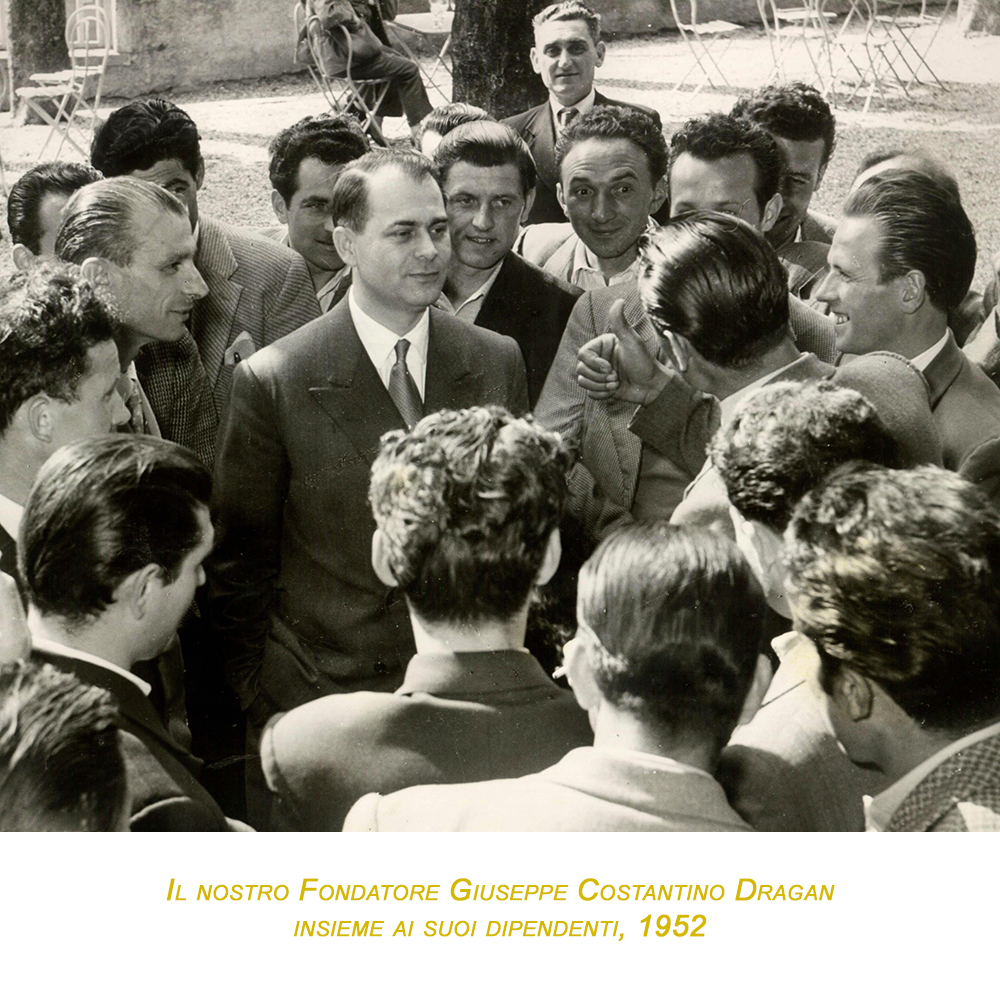NEWS
Veroniki Holding Celebrates the 75th Anniversary of ButanGas

The story of ButanGas began in Italy on December 13, 1948, thanks to the remarkable vision of Professor Giuseppe Costantino Dragan. After graduating in Law in Bucharest, Dragan won a scholarship in 1940 and moved to Italy to study Political and Economic Sciences at the “La Sapienza” University of Rome. Upon completing his studies, he immediately recognized the enormous potential of LPG. With a pioneering spirit, he founded ButanGas S.p.A., foreseeing that this still little-known fuel would become one of the leading domestic energy sources. His vision allowed the company to grow rapidly, becoming one of the major players in the sector.
This innovation supported the spread of a fuel that could reach virtually everywhere, even in areas without a gas distribution network, and helped the market flourish alongside Italy’s post-war economic boom. Since then, the history of ButanGas has been one of vision, commitment, and growth.
Today, the company’s long human and industrial journey continues under Veroniki Holding, founded in Milan in March 2010 as a central coordinating body of the Group by Dr. Daniela Veronica Gusa de Dragan, who has been leading the Group for 30 years, having received the Founder’s trust and mandate directly.
The Holding’s management currently includes Dr. Daniela Veronica Gusa de Dragan, Executive President; Eng. Christos Christofides, General Manager; Dr. Paolo Pellegrini, Market Development and Internal Control Director for LPG; Dr. Riccardo Gerosa, Chief Financial Officer; Lawyer Alberto Gallazzi, Head of Legal Affairs; Eng. Mario Caruggi, Head of Renewable Energy; and Dr. Francesco Lopez, Head of Marketing and Communications.
Veroniki Holding leads a multinational Group with 1.420 employees across 9 European countries (Italy, Greece, Romania, Germany, Poland, Serbia, Austria, France, and Spain), active in LPG, real estate, renewable energy (wind, hydroelectric, and photovoltaic), shipping, healthcare, food packaging in r-PET and PP, culture, and education.
The distribution of LPG represents the Group’s core business. In this sector, in addition to ButanGas in Italy, Veroniki Holding coordinates its subsidiaries PetroGaz in Greece, ButanGas Romania, DrachenGas in Germany, DragonGaz in Poland, PropanGas in Austria, and ButanGas International in Serbia. Over the years, the Group has also strengthened its presence in renewable energy, investing in projects including a 25 MW wind farm in Romania, inaugurated in 2011, seven hydroelectric plants in Italy, and a photovoltaic park in Catania.
Since its foundation in 1948, the Group has remained under family ownership, confirming its values year after year, particularly its mission to create value with integrity, to the benefit of customers, employees, and stakeholders, to become an increasingly efficient, solid, environmentally aware, and sustainable organization.
LPG: The Energy of the Future
Today LPG is considered one of the most important energy sources and, thanks to its characteristics, can be seen as one of the “energies of the future,” playing a fundamental role in the energy transition. What makes it valuable is its position as the most sustainable fossil fuel, serving as a powerful ally in the fight against climate change.
LPG can be considered a bridge fuel toward decarbonization by 2050. It will continue to play a central role in the energy mix, to progressively replace more polluting liquid and solid fuels, alongside other alternative gaseous fuels.
LPG is a by-product of crude oil and natural gas extraction and refining; if not recovered, it would otherwise be burned off and wasted. Compared to other traditional fuels, LPG produces lower emissions of carbon monoxide and unburned hydrocarbons. It also generates significantly less nitrogen oxides (NOx), carbon dioxide (CO₂), and particulate matter, making it a fuel that does not contribute to the greenhouse effect.
When discussing energy transition, it is essential to embrace a concept of transition that is fair and equitable for all. Until 2050, various liquid, gaseous, and solid fuels will continue to contribute significantly to the energy mix. While renewable energy will grow substantially, it will not be sufficient alone to meet the Net Zero scenario by 2050. True sustainability requires considering the entire supply chain: fuel neutrality, technological neutrality, and life-cycle analysis. The latter should serve as the fundamental tool for decision-making. Europe, for example, is not only made up of urban areas but also of rural regions, home to about 137 million people, who require dedicated policies. LPG, together with BioLPG, is a key bridge fuel to help achieve the European Green Deal objectives, providing an affordable and readily available energy source capable of decarbonizing off-grid areas, thanks to its ease of transportation and storage in liquid form.
Social Responsibility
Through associated cultural institutions—such as the Dragan European University, the Dragan European Foundation, and the General Stefan Gusa Foundation—the Group promotes projects that foster culture, education, and the values on which the Dragan Group has always been based.
A special mention goes to Decebalus REX, the monumental rock sculpture of Decebalus, the last King of the Dacians, created and funded by Professor Giuseppe Costantino Dragan. Unique in scale, the statue stands 42.9 meters high and 31.6 meters wide, making it the tallest rock sculpture in Europe. Carved into a cliff overlooking a bend of the Danube in Orsova, Romania, the monument is a symbol of cultural heritage and resilience.
The Group also places great emphasis on Social Responsibility through donations to non-profit organizations, children’s associations, cultural initiatives, hospitals, and research institutes. Among its recent projects: the creation of five clinical pathology laboratories equipped with state-of-the-art medical devices, and three schools for street children in India, developed by Katia Ambrosini and her team at Skychildren Onlus Monza. In the healthcare field, the Group also donated a robotic system for oncological surgery to the Fondazione IRCCS Istituto Nazionale dei Tumori. A central role in this project was played by Prof. Ugo Pastorino, whose professionalism and commitment helped connect the two institutions. This donation stands as a powerful message of how private initiative can help fill public service gaps, ultimately improving the quality of care.
Pubbliredazionale – Corriere della Sera
Pubbliredazionale – Sole 24 Ore
